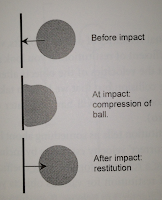Coefficient of Restitution affects the batted ball
speed and can be described as “The proportion of total energy that remains with
the colliding objects after the collision” (Blazevich, 2010).
Figure 3. Coefficient of restitution (Blazevich, 2010).
When the ball compacts on impact with the bat it undergoes restitution and loses some of its energy which is displaced into the bat and through sound vibrations. The less energy lost in the collision, the greater the coefficient of restitution (Blazevich, 2010). A slower ball that will collide with a bat will rebound at a slower rate and will not have as much speed as a faster ball, this is due to a lower restitution than the faster ball (Nathan, 2010).
Restitution is measured as an amount between 0 and 1, with 0 being all energy is lost in the collision and 1 being that all energy is saved (Blazevich, 2010). However, an increase in velocity may decrease the coefficient of restitution. By hitting a homerun in baseball off a faster pitched ball may just be the result of greater momentum, rather than the coefficient of restitution being of a greater value (Blazevich, 2010).

No comments:
Post a Comment